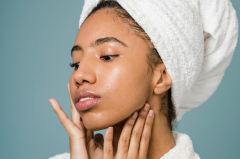In today’s fast-paced world, the value of a restful night’s sleep is often underestimated, as our busy lives and constant digital engagement steal precious hours. But what if the secret to glowing, youthful skin lies not just in your skincare routine, but in the way you sleep?
If you’re serious about achieving radiant, healthy skin, it’s essential to understand how quality sleep impacts your skin’s natural regeneration process. Research shows that inadequate rest can accelerate the signs of ageing, disrupt vital repair mechanisms and increase stress, all of which take a toll on your complexion. Prioritising sleep isn’t just a luxury — it’s a necessity for maintaining a glowing, refreshed appearance.
So, how can you transform your skin while you sleep? By embracing the power of quality rest, coupled with simple yet effective bedtime habits and the support of a tailored nighttime skincare routine, you can wake up to visibly brighter, more youthful skin.
The science of sleep and skin regeneration
Sleep is where the magic happens for your skin. While you rest, your body is busy working to repair, regenerate and restore. This is when your skin goes into full recovery mode — producing collagen, regenerating cells and repairing the damage done by the stresses of daily life, such as UV exposure and pollution.
“Sleep is when the skin’s natural repair processes are most active,” says cosmetic physician Dr Sarah Tranter. “Increased blood flow delivers oxygen and nutrients to the skin, while collagen production and cell turnover are heightened. These processes help repair damage from daily stressors like UV exposure and pollution, keeping the skin healthy and resilient.” Essentially, sleep is your skin’s opportunity to hit the reset button and stay youthful, firm and glowing.
Australia’s leading sleep expert, Olivia Arezzolo, says that the key lies in deep sleep specifically, which she calls the “holy grail” for skin health. “Research shows 70 per cent of human growth hormone is produced here, catalysing collagen production, reducing the appearance of wrinkles, fine lines and saggy skin,” she says. But it’s also a two-way street. “On the other hand, evidence also indicates a 20 per cent increase in inflammation with lack of sleep, leaving you blotchy and acne prone.”
It’s clear, deep sleep isn’t just about feeling rested. It’s about looking rested, too. When you don’t get enough quality sleep, the results could show up on your skin in the form of signs of ageing, puffiness, breakouts or an uneven complexion. On top of that, the pro-inflammatory effect of a lack of sleep can worsen skin issues such as acne and rosacea.
A clinical study further proves just how important sleep is for your skin’s recovery with results that revealed individuals who had better sleep showed a 30 per cent higher skin recovery rate after UV exposure compared to those who slept poorly, reinforcing the connection between restorative sleep and enhanced skin resilience.
Of course, beyond just improving skin appearance, sleep is also essential for the overall repair of the body. It is during sleep that the body restores energy, balances hormones and removes toxins — all of which are holistically connected to the health of your skin. When your state of wellbeing is flourishing, it means greater resilience to external stressors and a stronger ability to repair any damage that has been done throughout the day.
Creating an environment for restorative sleep
Dreaming of waking up with glowing skin? It all begins with crafting the ideal sleep environment. Quality sleep doesn’t just happen. It requires a space that supports your body’s complex natural cycles, allowing your circadian rhythm to sync effortlessly with your surroundings, so you wake up feeling (and looking) refreshed and revitalised.
Arezzolo explains that the key factors for creating the perfect sleep space are sensory related, and it ultimately comes down to controlling temperature, light and noise levels. “For temperature, aim for around 18 degrees Celsius, which is ideal for most people,” she recommends. “And if you’re using air conditioning or a fan, make sure your room stays cool enough to support the drop in body temperature that triggers sleep.”
Keeping your sleep environment dark and quiet tells your body it’s time to unwind and slip into deep, restorative sleep. When it comes to light, you’ll want to block it out. “Light suppresses melatonin, our sleep hormone, making it harder to fall asleep,” explains Arezzolo, who recommends an organic mulberry silk eye mask. The bonus? It will not only keep your eyes in slumber-supporting darkness, but silk will also prevent skin irritation. To overcome disruptive noise, Arezzolo recommends using earplugs or a white-noise machine to mask any unwanted sounds.
In addition to optimising your sleep space, incorporating a few pre-sleep habits can further enhance the quality of your rest, lending those hours of shut eye to skin-boosting benefits. A simple yet effective bedtime ritual, such as Arezzolo’s four-step sleep routine, helps ensure that you’re truly prepared for beauty sleep by incorporating practices such as reducing blue light exposure a couple of hours before bed, enjoying a calming shower or bath, supporting relaxation with targeted supplementation and taking time to wind down away from technology, whether with a good book or meditation.
The encouraging news? When it comes to rejuvenating beau





